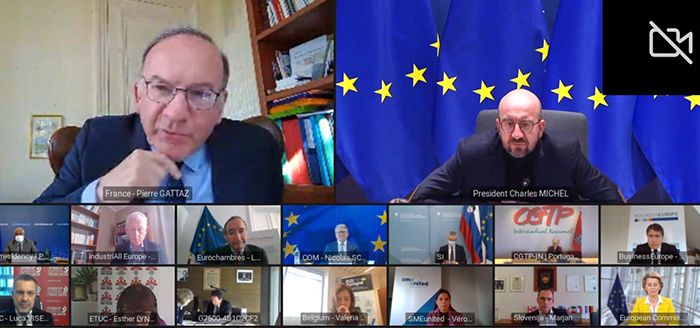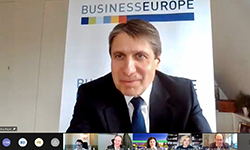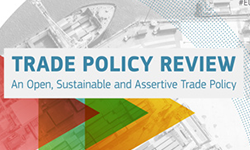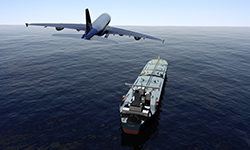BusinessEurope Headlines No. 2021-10
A wake-up call: Companies cannot absorb additional burden on top of the crisis

On 24 March, speaking at the Tripartite Social Summit video conference on behalf of employers, BusinessEurope President Pierre Gattaz said: "Faced with the worst economic crisis since the second world war, the European Union has mobilised unprecedented financial resources. Now is the time to make the next steps to pave the way to a solid recovery. Enterprises are key to achieve Europe’s ambitions. Based on signals received from members, BusinessEurope has to issue a wake-up call: companies cannot absorb additional burden on top of the crisis! The EU Recovery and Resilience Facility offers a once-in-a-generation opportunity to transform our economies by boosting productivity, growth and competitiveness. To make sure we make optimal use of these funds, the EU must focus on three priorities: 1. putting in place a well-articulated European economic agenda, 2. pursuing effective better regulation policies, 3. accelerating roll out of vaccines and minimising restrictions at internal borders within our Single Market.
![]() Contact: Maxime Cerutti
Contact: Maxime Cerutti
Financing the recovery
 BusinessEurope and the Association for Financial Markets in Europe (AFME) organised a webinar on "Financing the Recovery: The Role of Financial Markets in Rebuilding the European Economy" on Friday 19 March. For European businesses to recover from the economic crisis, access to finance will be more important than ever. This needs to include not only bank lending and debt issuance but also alternative sources of funding. The webinar featured a wide range of speakers from leading financial institutions and high-level policymakers in capital markets and was opened by BusinessEurope Director General Markus J. Beyrer who warned of a risk that an excessively sharp withdrawal of support for businesses could undo the work done over the last 12 months keeping viable businesses alive. It is important to avoid a sudden, damaging cliff edge.
BusinessEurope and the Association for Financial Markets in Europe (AFME) organised a webinar on "Financing the Recovery: The Role of Financial Markets in Rebuilding the European Economy" on Friday 19 March. For European businesses to recover from the economic crisis, access to finance will be more important than ever. This needs to include not only bank lending and debt issuance but also alternative sources of funding. The webinar featured a wide range of speakers from leading financial institutions and high-level policymakers in capital markets and was opened by BusinessEurope Director General Markus J. Beyrer who warned of a risk that an excessively sharp withdrawal of support for businesses could undo the work done over the last 12 months keeping viable businesses alive. It is important to avoid a sudden, damaging cliff edge.
Contact: Erik Berggren
Trade openness key to achieve EU resilience
 On 24 March, BusinessEurope Deputy Director General Luisa Santos was invited to the Trade Policy Committee of the European Council to share BusinessEurope’s views on the EU Trade Policy Review. She stated: "Trade policy can play a key role in the economic recovery of the EU after the COVID-19 pandemic and contribute to achieving resilience. For this to happen, the emphasis on the EU's reviewed trade policy in the framework of 'open strategic autonomy' must be put on openness, to allow the EU to continue to reap the benefits of trade and globalisation." BusinessEurope also sees the positive contribution trade can have to the digital and green transformation at all levels – from the multilateral to the unilateral. Santos commented: "The EU cannot go alone and needs to actively engage with its major trading partners. This is essential to make the rules-based trading system more sustainable and adjusted to today’s trade reality. In this context trade agreements play an important role, but apart from negotiating the EU must also be able to deliver and ratify these agreements." BusinessEurope is currently analysing all the proposals presented in the recently published Communication on the EU Trade Policy Review and is preparing concrete suggestions.
On 24 March, BusinessEurope Deputy Director General Luisa Santos was invited to the Trade Policy Committee of the European Council to share BusinessEurope’s views on the EU Trade Policy Review. She stated: "Trade policy can play a key role in the economic recovery of the EU after the COVID-19 pandemic and contribute to achieving resilience. For this to happen, the emphasis on the EU's reviewed trade policy in the framework of 'open strategic autonomy' must be put on openness, to allow the EU to continue to reap the benefits of trade and globalisation." BusinessEurope also sees the positive contribution trade can have to the digital and green transformation at all levels – from the multilateral to the unilateral. Santos commented: "The EU cannot go alone and needs to actively engage with its major trading partners. This is essential to make the rules-based trading system more sustainable and adjusted to today’s trade reality. In this context trade agreements play an important role, but apart from negotiating the EU must also be able to deliver and ratify these agreements." BusinessEurope is currently analysing all the proposals presented in the recently published Communication on the EU Trade Policy Review and is preparing concrete suggestions.
Contact: Luisa Santos
COVID-19 impact and role of the Single Market in recovery
 On 24 March, BusinessEurope Internal Market Policy Committee met to discuss the impact of COVID-19-related restrictions in the Single Market and the role of its freedoms in the green and digital recovery. The committee welcomed for a discussion Anna Cavazzini (MEP, Greens/EFA), Chair of the European Parliament Internal Market and Consumer Protection (IMCO) Committee, and exchanged views with Outi Slotboom, a newly appointed Director for Strategy and Economic Analysis at DG GROW of the European Commission, on the recent and upcoming response to the crisis by the Commission. Participants agreed that in the crisis as the one of today, vital Single Market basics should be protected. The business community also stressed that regulatory burdens had to be reduced, while in the normal circumstances the burden control mechanisms should be vigorously applied to ensure good business environment. In the medium term, barriers of the Single Market should be continuously removed, and this should be borne in mind when policy-makers discuss any new initiatives, notably on the green and digital transition. In addition, Europe needs a forward-looking strategy that both builds on the Single Market strengths and foresees contingency measures for any future crises, not to be caught by surprise and to ensure that businesses can navigate through turbulent times in a coordinated and smoothened regulatory environment. BusinessEurope remains open to discuss such contingency measures with the EU policy-makers.
On 24 March, BusinessEurope Internal Market Policy Committee met to discuss the impact of COVID-19-related restrictions in the Single Market and the role of its freedoms in the green and digital recovery. The committee welcomed for a discussion Anna Cavazzini (MEP, Greens/EFA), Chair of the European Parliament Internal Market and Consumer Protection (IMCO) Committee, and exchanged views with Outi Slotboom, a newly appointed Director for Strategy and Economic Analysis at DG GROW of the European Commission, on the recent and upcoming response to the crisis by the Commission. Participants agreed that in the crisis as the one of today, vital Single Market basics should be protected. The business community also stressed that regulatory burdens had to be reduced, while in the normal circumstances the burden control mechanisms should be vigorously applied to ensure good business environment. In the medium term, barriers of the Single Market should be continuously removed, and this should be borne in mind when policy-makers discuss any new initiatives, notably on the green and digital transition. In addition, Europe needs a forward-looking strategy that both builds on the Single Market strengths and foresees contingency measures for any future crises, not to be caught by surprise and to ensure that businesses can navigate through turbulent times in a coordinated and smoothened regulatory environment. BusinessEurope remains open to discuss such contingency measures with the EU policy-makers.
Contact: Martynas Barysas
A modernised EU GSP scheme should further motivate economic diversification
 In the context of the Generalised Scheme of Preferences (GSP) engagement week that took place on 22-25 March, BusinessEurope was invited to join the panel debate on "the GSP and export diversification". The EU Generalised System of Preferences is a scheme exemplifying best the cooperation between trade and development policies, offering access to the EU market to those countries that need it the most. The GSP is also a strong lever to promote sustainability, rule of law and good governance, and its currently on-going revision is also expected to deliver more results in the area of environmental protection and green trade. Focusing on ways to ensure that a modernised GSP does more to help beneficiary countries diversify their exports, Sofia Bournou, Senior Adviser in BusinessEurope’s International Relations department, stated: "There are two key elements in the scheme that the EU needs to look at in this context - product coverage and product graduation. The EU could, for instance, look into expanding the coverage to sustainably produced goods, being careful to remain fully compatible with WTO rules. Moreover, the EU should ensure that preferences are not granted to goods that are already competitive in the EU market. Therefore, maintaining and extending product graduation to more beneficiary countries can serve as a motive for countries to diversify their economies." The European Commission is expected to present its proposal for an EU GSP regulation review in July 2021.
In the context of the Generalised Scheme of Preferences (GSP) engagement week that took place on 22-25 March, BusinessEurope was invited to join the panel debate on "the GSP and export diversification". The EU Generalised System of Preferences is a scheme exemplifying best the cooperation between trade and development policies, offering access to the EU market to those countries that need it the most. The GSP is also a strong lever to promote sustainability, rule of law and good governance, and its currently on-going revision is also expected to deliver more results in the area of environmental protection and green trade. Focusing on ways to ensure that a modernised GSP does more to help beneficiary countries diversify their exports, Sofia Bournou, Senior Adviser in BusinessEurope’s International Relations department, stated: "There are two key elements in the scheme that the EU needs to look at in this context - product coverage and product graduation. The EU could, for instance, look into expanding the coverage to sustainably produced goods, being careful to remain fully compatible with WTO rules. Moreover, the EU should ensure that preferences are not granted to goods that are already competitive in the EU market. Therefore, maintaining and extending product graduation to more beneficiary countries can serve as a motive for countries to diversify their economies." The European Commission is expected to present its proposal for an EU GSP regulation review in July 2021.
Contact: Sofia Bournou
Decarbonisation in the aviation and maritime sectors
 "The European aviation and maritime sectors are facing huge decarbonisation challenges in the next decades, such as the current lack of market-ready zero-emission technologies, long development and life cycles of aircraft and vessels, significant investments to be done in refuelling equipment and infrastructure, and international fierce competition. The massive deployment of alternative sustainable fuels is key for decarbonising these sectors", commented BusinessEurope in a new position paper. The paper brings recommendations for effectively decarbonising the aviation and maritime modes of transport. Calling for a European approach to alternative sustainable fuel, BusinessEurope stresses: "we welcome the European Commission’s plans to come with two dedicated initiatives referred to as 'ReFuelEU Aviation' and 'FuelEU Maritime' to ramp up the production, deployment and supply of affordable, high quality alternative sustainable fuels in Europe. Having two distinct and tailor-made initiatives is important in order to fully take into account the specific technological and economic challenges of each sector whose business models still have to be built to guarantee their viability and profitability."
"The European aviation and maritime sectors are facing huge decarbonisation challenges in the next decades, such as the current lack of market-ready zero-emission technologies, long development and life cycles of aircraft and vessels, significant investments to be done in refuelling equipment and infrastructure, and international fierce competition. The massive deployment of alternative sustainable fuels is key for decarbonising these sectors", commented BusinessEurope in a new position paper. The paper brings recommendations for effectively decarbonising the aviation and maritime modes of transport. Calling for a European approach to alternative sustainable fuel, BusinessEurope stresses: "we welcome the European Commission’s plans to come with two dedicated initiatives referred to as 'ReFuelEU Aviation' and 'FuelEU Maritime' to ramp up the production, deployment and supply of affordable, high quality alternative sustainable fuels in Europe. Having two distinct and tailor-made initiatives is important in order to fully take into account the specific technological and economic challenges of each sector whose business models still have to be built to guarantee their viability and profitability."
![]() Contact: Alexandre Affre
Contact: Alexandre Affre
Calendar 
- 13 April: Getting the future right: Towards smarter and people-centred skills intelligence
- 23 April: High-level EU-Africa green investment forum
Not yet a subscriber? Register here.
Reminder: please have a look at our privacy policy